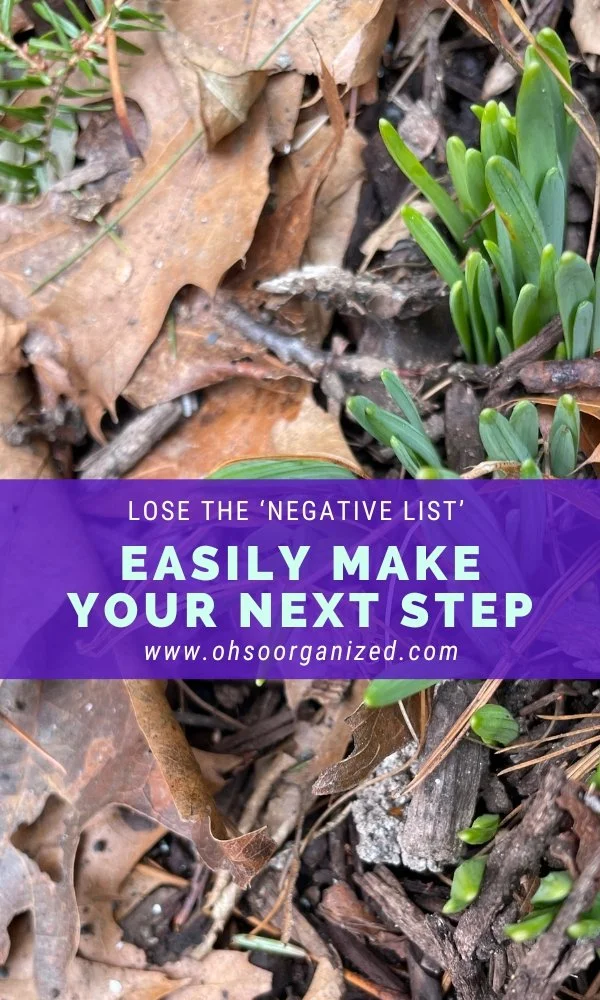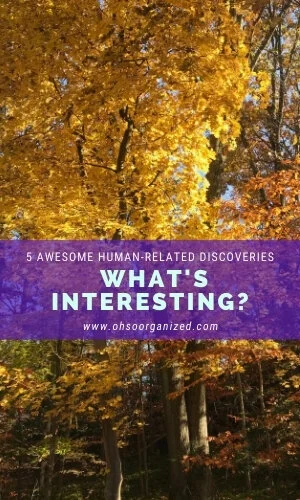Yes. It’s still officially winter, and our recent run of several warm days has reverted to colder temperatures. Despite the fluctuating thermometer, I notice hopeful signs of spring as nature begins its blooming ritual. Frequent sightings of green plants push through the ground to greet the blue sun-filled sky. They don’t hesitate. After being dormant for months, rejoining life with gusto is their next step.
Nature’s confident growth got me thinking about things that prevent us from moving forward.
How about the mile-long to-do list?
Is yours dormant and paralyzing?
Or are you actively working on it?
Is your list meaningful and necessary?
Or is it filled with tasks that aren’t essential and you don’t care about?
Is your list so daunting that it brings up negative feelings, regret, and disappointment?
Or instead does it inspire you to act?
If you are struggling to determine your next step, here is a novel idea: Lose your ‘negative list.’ Crumple it up, let it go, and say buh-bye! That might sound radical, and perhaps it is. But can you imagine doing it anyway? And if you did, what might happen?
What’s On Your Negative List
Things holding you back can be concrete or emotional. They might include things like:
Thought loops with messages such as “I can’t” or “I’m not good enough”
Projects that would be nice to do, but realistically you’ll never get to
Thank you notes that are years overdue
Plans you wanted to make with friends or family, but never did
Piles of magazines with articles to clip and file
Stuff inherited from other people’s lives to sort and edit
Papers and objects representing previous careers or life stages to curate and edit
Without realizing it, I had a negative list. It included feeling bad about not yet:
Finishing my 2024 review or 2025 plan (and it’s already March!)
Selecting my 2025 word or motto
Choosing the topic and scheduling my next workshop
Creating a video about virtual organizing
Make Your Next Step Easier
It may sound too simplistic to lose or release your negative list. However, recognizing how it might be holding you back makes it worth trying.
Maybe you’ll decide you still want to attend to some things on that list. And if so, perhaps a reframe of how you think about that ‘thing’ will make the difference. For example, instead of the projects you’ll never get to demotivating you, celebrate the ones you have accomplished. Review the remaining ones to decide if one is worth pursuing. If so, think about it as a project you get to, not have to do. Release the rest.
As Oliver Burkeman says in Four Thousand Weeks, our time is limited. “The average human lifespan is absurdly, terrifyingly, insultingly short.” We will never get everything done or be able to pursue every possibility that exists. Burkeman says, “we’ve been granted the mental capacities to make almost infinitely ambitious plans, yet practically no time at all to put them into action.”
Recognizing these limitations can be freeing. Don’t try to do everything. Instead, let go of what is holding you back and pursue what’s most meaningful and necessary.
Selecting next will become easier. Guilt will be gone. Action and intention will rule the day. What comes next will be joyfully embraced once you are unencumbered by the lingering tasks you’ve chosen to release from your list.
“The average human lifespan is absurdly, terrifyingly, insultingly short.”
What’s Next?
I might forgo choosing a new word and motto this year and even skip a deeper review of 2024. Just considering that option makes me feel lighter and more energetic. After all, I imposed these things on myself, and I can just as quickly release them from my list.
My next steps will prioritize energizing and nourishing actions, projects, and ideas. What will be next for you? What can you release that is holding you back? I’d love to hear your thoughts. I invite you to join the conversation.
How Can I Help?
Do you want support organizing, planning, or figuring out your next step? I’d love to help! Virtual organizing is an extraordinary path forward – local feel with a global reach.
Please schedule a Discovery Call, email me at linda@ohsorganized.com, or call 914-271-5673. Change is possible, especially with support.

















